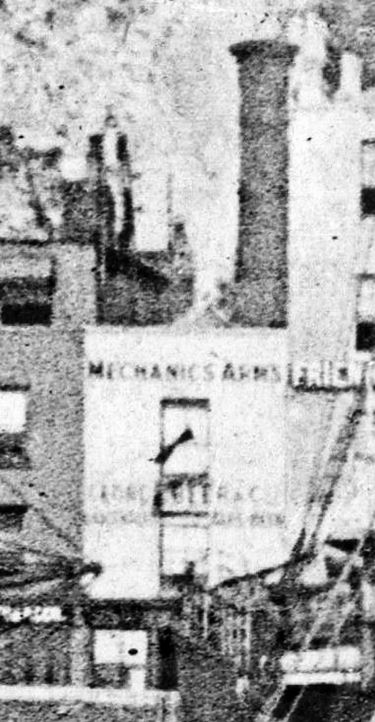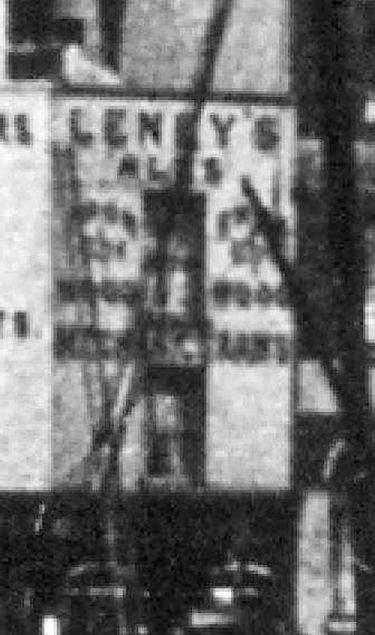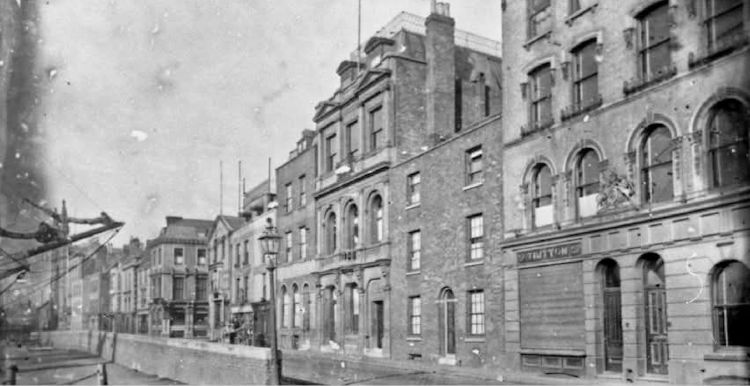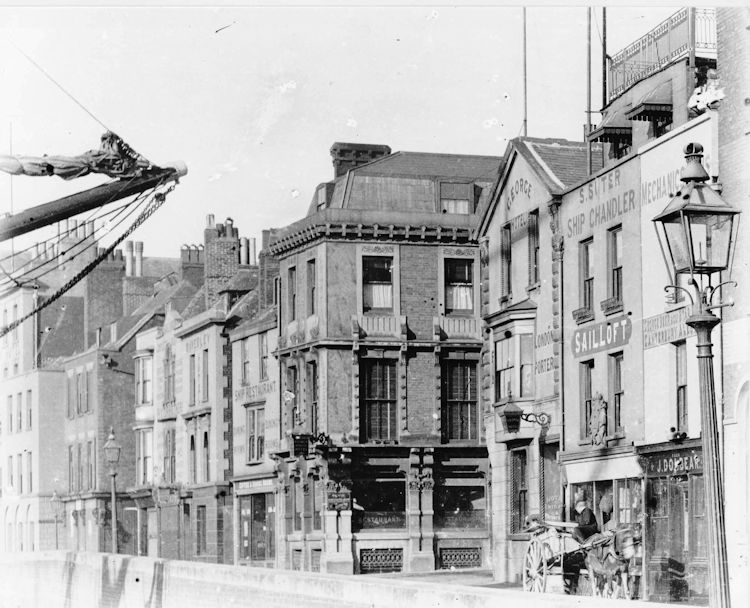|
Strond Street
Dover
 
Above photos, date unknown, kindly supplied by Paul Wells. |

Above photo show the "Mechanics' Arms" centre of picture and
two doors to the left with the flagpoles, the "George
Hotel." |

Above photo, date unknown. "Mechanics Arms"
right, "George Hotel" next left, "Prince
Imperial" central. |
I have to say first that this sign was reported in Buckland Road in 1861,
1865 and 1867. (Click here). The Strond Street amenity was fully licensed by 1869. From
1874 it opened at five a.m. I have now managed to trace it back as far as
1861, so it seems the two where open at the same time. Hope my research
doesn't reflect this confusion.
Redundancy was proved in 1911 when Dover Harbour Board were compensated
with £50 they being the freeholders. The lessee was paid £100 and the
sub-lessee, Alfred Leney £262. £41 was allotted to the tenant.
|
From the Dover Express and East Kent
News, Friday 26 February, 1869.
WHOLESALE FELONY
John Heilman, a German shoemaker, living in Military Road, and Henry
Heilman, a boy of about twelve years of age, his son, were charged with
stealing one bottle of Irish Whiskey, one bottle of cloves, and one
bottle of shrub, from the "Mechanics' Arms" public-house, Strond Street.
Edward Sutton, landlord of the "Mechanics' Arms," Strond Street, said
the prisoners came into his house at five minutes to eleven the previous
night, and the elder called for a pint of beer. They remained for about
five minutes. The man had a carpet bag with him. On witness turning his
back for a minute, to go into the bar parlour, he heard the clink of a
bottle, and on getting back to the bar he missed the bottles produced,
which had been standing on a shelf over the counter. the man was then
doing something with the carpet bag, which was between him and the boy.
Witness accused the prisoners of stealing the bottles, and he saw
another bottle, which had also been standing on the shelf a moment
before, under a seat behind the prisoners. Witness called to his wife to
go for a policeman, and caught hold of both prisoners; but the man
succeeded in getting away. The carpet bag was left in the boy's
possession, and on the policeman arriving it was found to contain the
three bottles produced. Witness gave the boy into custody of the
policeman, and on going along the Pentside their way to the
station-house they met the other prisoner, whom he also gave into
custody.
Police-constable Levett deposed to taking the prisoners into custody.
The prisoners were also charged with stealing a jar of tobacco, the
property of Mrs. Elizabeth Monger, tobacconist of Snargate Street. In
this case it appeared that the prosecutrix had missed the jar of tobacco
on the previous evening about half-past nine o'clock, and that it was
found after prisoners were taken into custody at the father's house, 23,
Military Road. In the carpet bag found in the prisoners' possession some
scrapes of tobacco corresponding with the tobacco in the jar were
discovered.
The prisoners were committed to trial at the next Quarter Sessions on
both charges.
The prisoners were then charged with stealing three decanters
containing spirits, the property of Mr. Charles Pain, landlord of the "Wellington
Inn," Biggin Street.
The prisoners, it seemed, committed this offence under circumstances
similar to those in the first case. They had entered the bar at about
ten o'clock on the previous night, and having been supplied with a small
quantity of rum, for which the elder prisoner paid, took advantage of
the landlord's absence to steal the decanters in question, which were
subsequently found by the police when the house of the older prisoner
was searched.
In this case the boy confessed that he took the bottles.
The prisoners were committed for trial in this case also; and it was
stated that there were several other charges against them. It was
thought by the Bench, however, that these cases would be sufficient upon
which to commit them.
|
|
From the Dover Express and East Kent News, Friday, 11 February, 1870.
PUBLIC HOUSE ROBBERY.
William Steven's a tramp, was charged with stealing from the Mechanic's
Arms Public House, Strond Street, a cloth coat, a cotton handkerchief,
and a bradawl the property of the landlord and worth 5s.
William
Humphrey's the landlord of the "Mechanics' Arms" identified the articles as
his property. The bradawl and the handkerchief were in the pocket of the
coat, which he had hung in the taproom on the previous morning. He saw
the prisoner in the house in the course of the evening and after he had
gone and the coat and the contents were missed. Immediately on missing
the articles he gave the information to the police and this led to the
prisoners apprehension.
George Maxted a labour living at 51, Oxenden Street said he was at the
"Mechanics' Arms" about eight o'clock on the previous evening. When he
entered the prisoner was drinking in front of the bar; but the prisoner
shortly afterwards came into the tap-room and took the coat produced
from a nail on which it was hanging. He afterwards sat down in a chair
for a while; but he very quickly got up again, and throwing the coat over
his shoulder left the room and went out of the house. Witness drew the
landlord's attention to the circumstances and information was given to
the police. The prisoner had been drinking.
Police Sergeant Bailey deposed to taking the prisoner into custody on
the previous evening about nine o'clock at the "Lord Nelson," Public House
in St. James Lane. He was wearing the handkerchief round his neck and
had the coat also in his possession. Witness took him to the station-house where he begged very hard of the prosecutor to let him go.
The
prisoner pleaded guilty to the charge, but said he should not have taken
the coat had he not been under the influence of liquor.
In reply to the
magistrates, Sergeant Bailey said the prisoner was not drunk when he
apprehended him.
The magistrates sent the prisoner to gaol for
twenty-one days, with hard labour.
|
|
From the Dover Express and East Kent Intelligencer, 8 September, 1871. Price 1d.
ANNUAL LICENSING MEETING
TRANSFERS
In the case of Mr. Stephen Craddock, to whom the license of the
“Mechanics Arms” was transferred, he was reminded that there was already
one conviction against him in respect of another house he had recently
kept, and he was cautioned to be careful for the future.
|
|
From the Dover Express and East Kent Intelligencer, 6 January, 1882. Price 1d.
FOUND DROWNED
An inquest was held on Wednesday, afternoon last, at the “Union Hotel,”
Commercial Quay, before the Borough Coroner (W. H. Payn. Esq.), on the
body of a man, name unknown, who had been picked up in the harbour.
Mr. H. Smith was chosen foreman of the jury, and the body having been
viewed, the following evidence was taken:-
Thomas Craddock, landlord of the “Mechanic's Arms,” Strond Street, said:
At about a quarter to five o'clock on Monday last, the deceased came
into my house and asked me for relief, as he said he was a carpenter out
of employment . I and a fisherman gave him a penny each. While talking
to me he told me that he had pawned his coat for 2s. 6d., and had a wife
and six or eight children, and had not tasted food for the previous two
days, and was wondering what he was going to do for the night's lodging.
The deceased then left the house, and I have not seen him since till
to-day at the dead-house. He looked destitute when he came into my
house.
By the Foreman of the Jury: The deceased further told me he came through
Hastings, and was receiving eight shillings a week from the Carpenter's
Association.
Stephen Newington, a mariner, said: At about half-past seven o'clock
yesterday morning, I was walking over the Wellington Bridge of Dover
Harbour, when I saw the body of the deceased floating in the water
below. I ran for the Police, leaving a man with a boat-hook keeping the
body close to the wall. On returning I assisted the Police and others in
getting the deceased out of the water and to the dead-house. His hat had
been pressed tightly over his head.
By the Foreman: Some paper taken from the pocket of the deceased was
dry. He was quite dead and his hands were cold, but the body was still
limp. It was found about four feet on the inside of the bridge. The man
I left the body with thought he ought not to take the body out till the
police saw it.
A Juror: A case of waiting till he was properly drowned.
Another Juror: Five shillings for a dead body, and nothing for a live
one.
Vincent Davison, a sailor in the employ of the Dover Harbour, said:
Yesterday morning at about half-past seven o'clock I saw two men
standing by the Wellington Gates. I said, “Hulloa, what is up here,” and
they pointed to the body of the deceased. One of the men was holding it
close to the wall with a boat-hook, and I procured a rope and fastened
it round the body, and shortly after the police came and assisted in
getting the body up on the quay. He was quite dead.
By the Foreman: He didn't seem stiff. One or two men could not get a man
up the quay alone. I was there about a quarter of an hour before the
police came.
Police-constable Pilcher: At eight o'clock yesterday morning I was on
duty at the top of Snargate Street, when the witness Newington told me
there was a body floating in the water by the Wellington Bridge. I went
and found witness Davison with a rope round the body. With assistance I
got the deceased out of the water. I found the man was very warm, and I
sent for Dr. Duke, and had the body removed to the dead-house. The
doctor came shortly afterwards and examined the deceased. I searched the
body, and found the piece of paper produced, and a pawnbroker's ticket
for a coat, pledged for 2s. 6d. at Mr. Barnard's, last Lane, in the name
of Robert Brown, of no fixed residence, on the 2nd January.
Edwin Duke, surgeon, said: At about eight o'clock in the evening, I was
called to the dead-house to see the deceased. I examined the body and
found that both arms and legs were cold and flexible, but the trunk was
slightly warm. He appeared to have been dead about an hour. I could
detect no marks of violence whatever and I attributed the cause of death
by drowning.
The Jury, after a short discussion, returned an open verdict of “Found
Drowned.”
|
|
From the Dover Express and East Kent News, Friday, 1 May, 1891. Price 1d.
RESCUE FROM DROWNING
At about noon on Saturday, a boy, seven years of age, named Cole, son of
the landlord of the “Mechanic's Arms,” fell into the Harbour near the
"Union Hotel,” and had a very narrow escape from drowning. A quay
labourer named Peter Smith, hearing the cries ran to the edge and jumped
into the water, and was able to bring him safely to shore.
On Monday morning, a boy named Albert Sutton, living at 4, St. John's
place, fell into the Harbour near the same spot, and was rescued by Mr.
Thomas Gillman, of 30, Commercial Quay.
|
|
From the Dover Express and East Kent News, 3 February, 1911.
DOVER LICENSING SESSIONS
MECHANICS ARMS, STROND STREET
This was a notice of objection to the "Mechanics Arms," Strond Street, on the ground of redundancy.
Mr. R. Mowll said that he appeared, but he was not to press an
objection to the licence being taken away.
The Chief Constable said hat the "Mechanics Arms" was fully licensed,
and situated in Strond Street. The brewers were Messrs. A. Leney and Co.
The present tenant was Mr. A. Farrow, and it was transferred to him on
June 12th, 1903. The rateable value was gross, £26; nett, £21. The
licensed house in the immediate neighbourhood were the "Prince
Imperial," the "Barley Mow," the "Union"
(Commercial Quay). There was a club room upstairs.
Inspector Lockwood said that in six visits he found ten customers.
The Magistrates without retiring, stated that the house would be sent
forward to the Compensation Authorities to deal with.
|
|
From Dover Express 21 July 1911.
DOVER PUBLIC HOUSE CLOSURES. CORPORATION LOSE HOPED-FOR COMPENSATION.
The East Kent Licensing Compensation Authority on Wednesday confirmed
the decision of the Magistrates at Dover as to the closing under
compensation awards of the "Eight
Bells," New Street, the "Clarence Inn,"
Council House Street, and the "Mechanic's
Arms," Strond Street.
|
LICENSEE LIST
HILL William 1861+  (Also Millwright)
(Also Millwright)
SUTTON Edward 1869
HUMPHREYS William 1870
 CRADDUCK Thomas 1871-82+ (age 60 in 1881
CRADDUCK Thomas 1871-82+ (age 60 in 1881 ) )
 
DOLBEAR James 1884-Sept/90


COLE Joseph Sept/1890-99
(age 44 in 1891 ) )  
SHARP George 1890 end (?)
JONES Frederick 1901-Mar/02
 
BONNER Thomas Mar/1902+ (Late gardener of Chesham, Bucks)
 PHARRO Alfred June/1903-11
PHARRO Alfred June/1903-11
 (age 60 in 1911
(age 60 in 1911 ) )

 From the Post Office Directory 1874 From the Post Office Directory 1874
 From the Post Office Directory 1882 From the Post Office Directory 1882
 From the Post Office Directory 1891 From the Post Office Directory 1891
 From Pikes Dover Blue Book 1895 From Pikes Dover Blue Book 1895
 From the Kelly's Directory 1899 From the Kelly's Directory 1899
 From the Post Office Directory 1901 From the Post Office Directory 1901
 From the Dover Express From the Dover Express
 Census Census
|



